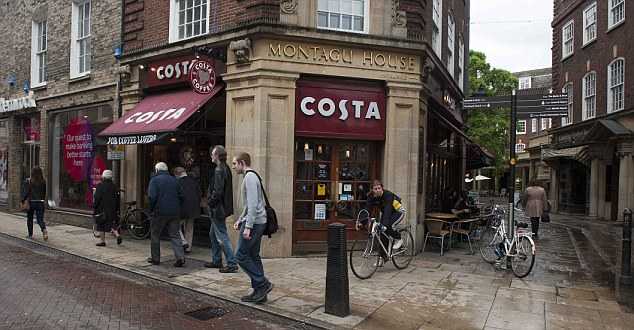At The Coca-Cola Company, we’re continuing to evolve as a total beverage company. This means we sell Coke, of course, but also so much more.
Today, we’ve taken another important step toward becoming the total beverage company we aspire to be.
Coca-Cola has reached a definitive agreement to acquire Costa Limited, which is based in the United Kingdom and has operations across much of Europe, Africa, the Middle East and Asia Pacific. Subject to the satisfaction of customary closing conditions, we expect the transaction to close in the first half of 2019.
Why Costa? And why now?
Let’s start with the simplest question, which is why now. It’s because coffee helps us get into hot beverages. Coffee is one of the fastest-growing beverage categories in the world, at 6%. It’s also a category with many different elements, from vending to coffee shops to roast-and-ground to instant to pods and capsules.
In short, coffee is a big business with many formats. It’s also a remarkably fragmented business. No single company in the world has a strong foothold across all parts of coffee.
And that includes Coca-Cola. We have great brands like our ready-to-drink Georgia coffee lineup in Japan, but Coca-Cola doesn’t have a broad, global portfolio in this growing category.
At The Coca-Cola Company, we’re continuing to evolve as a total beverage company. This means we sell Coke, of course, but also so much more.
Today, we’ve taken another important step toward becoming the total beverage company we aspire to be.
Coca-Cola has reached a definitive agreement to acquire Costa Limited, which is based in the United Kingdom and has operations across much of Europe, Africa, the Middle East and Asia Pacific. Subject to the satisfaction of customary closing conditions, we expect the transaction to close in the first half of 2019.
Why Costa? And why now?
Let’s start with the simplest question, which is why now. It’s because coffee helps us get into hot beverages. Coffee is one of the fastest-growing beverage categories in the world, at 6%. It’s also a category with many different elements, from vending to coffee shops to roast-and-ground to instant to pods and capsules.
In short, coffee is a big business with many formats. It’s also a remarkably fragmented business. No single company in the world has a strong foothold across all parts of coffee. And that includes Coca-Cola. We have great brands like our ready-to-drink Georgia coffee lineup in Japan, but Coca-Cola doesn’t have a broad, global portfolio in this growing category.
Today, with the growth in coffee and hot beverages, it’s more important than ever that Coca-Cola make a serious and significant investment in the category, because it’s the right thing to do to serve our consumers with more of the drinks they want, which in turn helps our customers.
So, why Costa?
Because Costa is a good fit – and the best way – for Coca-Cola to add a global coffee platform that will complement our existing system.
Let me be very clear about why I use the word “platform” and not “brand.” A platform means Costa isn’t just one thing. Not just a brand. Not just a retail operation. Not just vending. Not just a coffee roaster.
A platform is all of those things and more. Costa is a platform with a great supply chain in coffee, a world-class roastery, a strong retail presence and a vending system. Costa has strengths in many countries and in many key distribution channels of the coffee business.
And yes, it’s a great brand. I know many people aren’t familiar with Costa, especially if they live in North and South America, where Costa isn’t part of the marketplace. But Costa has a deep heritage, especially in its home market of the UK, where it is the leading coffee company.
So, by acquiring Costa, Coca-Cola will add a retail footprint in parts of the world
There are a couple of elements that are valuable here. Retail shops are important for sales of course, but they’re also pivotal in building a brand so it can have even more success beyond its own stores, like in immediate consumption channels.
Costa has a fresh espresso-based system called Costa Express. There are currently more than 8,000 machines already in-market. We see opportunities to expand this system in immediate consumption and experience channels.
Costa has great roast and ground beans for restaurants and cafes. The Coca-Cola system has enormous reach in many channels, and we see the potential to expand and offer these high-quality Costa coffee solutions to our existing customers. This great coffee capability will also allow us to expand at-home offerings.
Finally, Costa offers great opportunities in ready-to-drink beverages
Coca-Cola has bottled and canned coffees in a few markets – think Georgia coffee in Japan. The Costa brand has potential for expansion into ready-to-drink coffee across many markets globally.
So, Coca-Cola and Costa have remarkably complementary businesses. Costa offers Coca-Cola the best opportunities to create value in coffee. We can be better together.
This is not an acquisition where we’re looking for places to save costs in the business. We’re buying Costa to grow the business and our participation in the category.
It’s very important to me that we let Costa be Costa. We’ll operate Costa with our successful, connected-but-not-integrated model within Coca-Cola.
Costa is a very different business for us, and we want current Costa employees – from executives in the UK to baristas in stores around the world – to be assured that we respect and value their expertise.
These are times of remarkably fast changes in our industry. I’m excited about Costa because it can help Coca-Cola become even better – together, Coca-Cola and Costa will take another great step as a total beverage company.
James Quincey is president and CEO of The Coca-Cola Company















